The WITS Fall Apprentice, CJ Wiggan, wrote about their experiences teaching at Parkrose High School with WITS Writer Matt Smith. CJ is on the WITS teaching roster for spring of 2021.
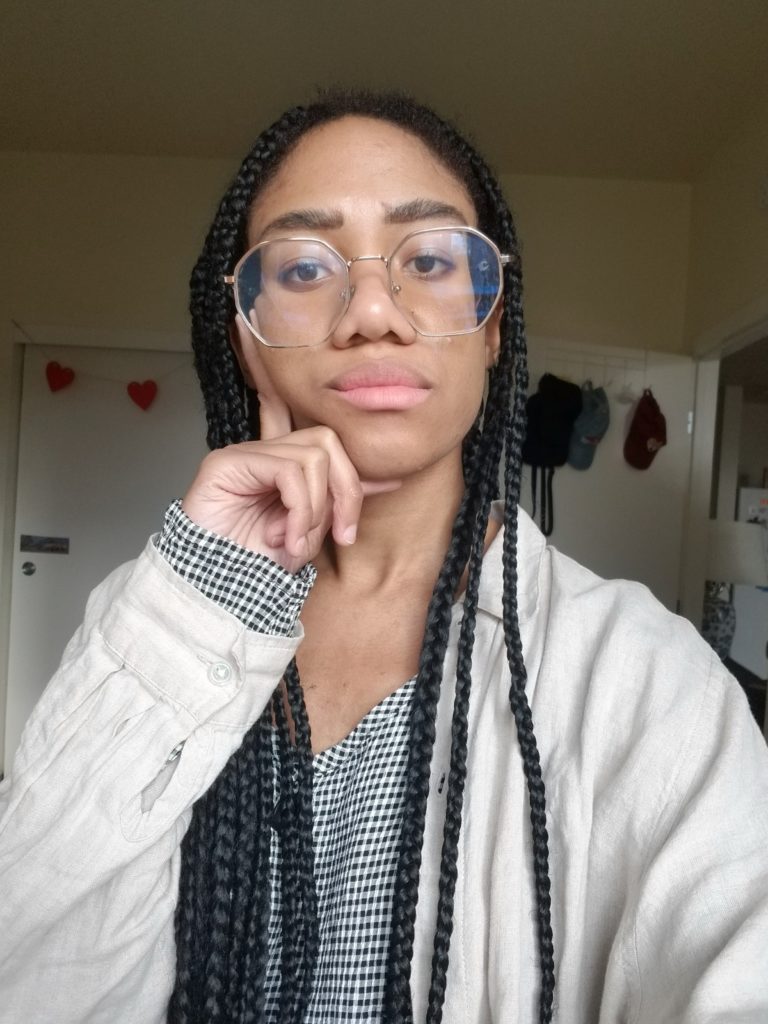
Coordinating the time I would meet Jules Ohman, WITS Program Specialist, outside my apartment building in Old Town Chinatown had become one of the most highly anticipated events of my current life. Jules was meeting me to drop off my individually prepped orientation materials before the start of the Writers in the Schools residency, fall semester. Seeing the young program specialist in person would give all the jittery feelings and ideas I’d been having for the past several weeks a place to settle. A paid internship in the midst of all this! Besides that, I hadn’t met anyone besides a grocery delivery person at my apartment in months. Especially since even before weeks and months had begun to stretch to where they were now I hadn’t been one to have many friends over. But now, who would I miss less if I’d seen them when I could have? The answer is Everyone.
Jules and I exchanged several text messages leading up to the delivery of WITS materials. It was like, “Okay, yes I’m free, but I’m on the bus.”
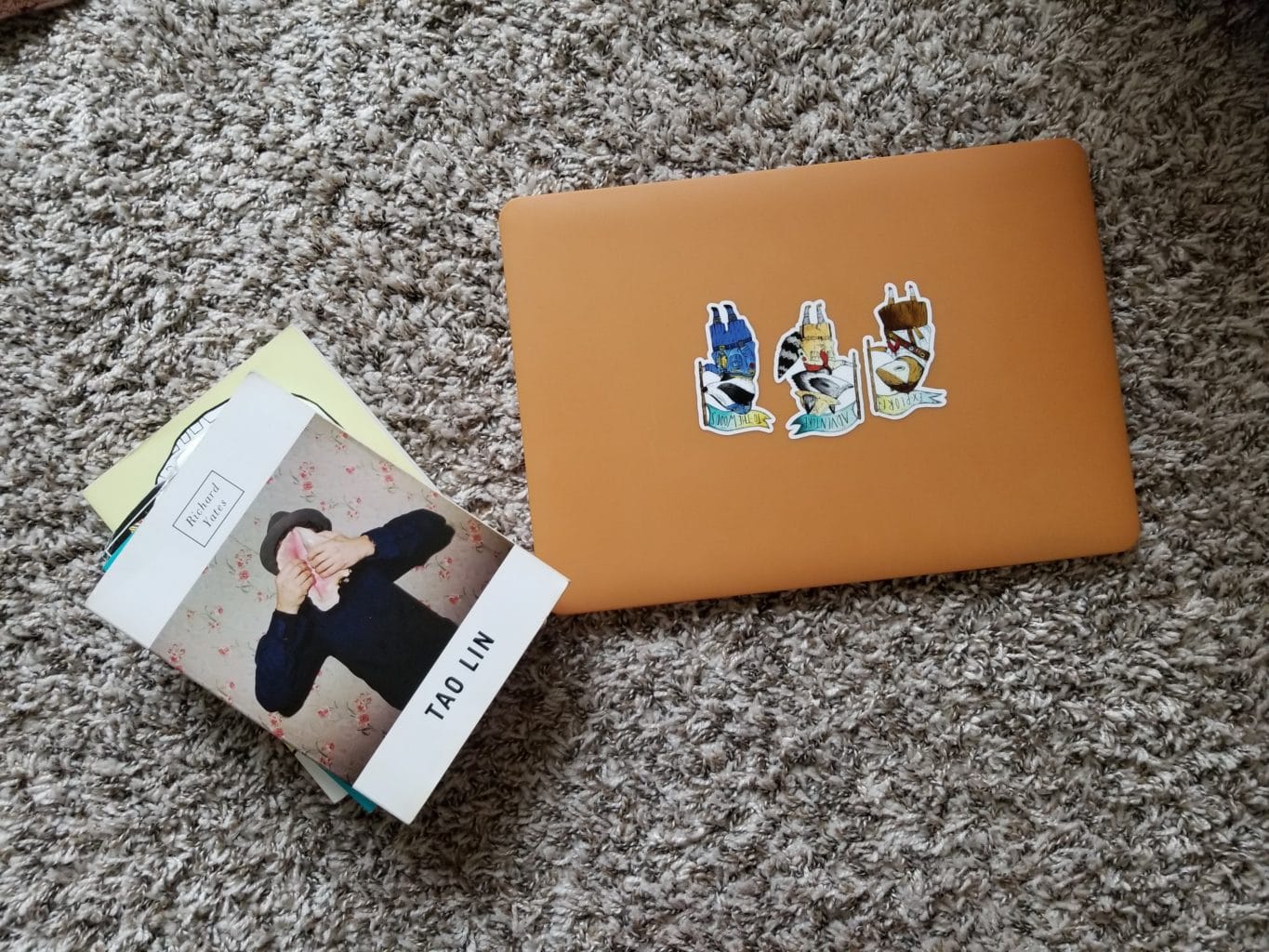
“Now I’m home!”
“I’m still here, but I might be on the elevator going back up.” Worked up messages that really did not need to be sent but who wanted to be sent so badly that I had to let them go.
When we finally made contact it was contactless. The exchange was quick, almost too efficient like a rescheduled delivery with Amazon. But Jules was definitely friendlier than Amazon, and the importance of the moment felt acknowledged. I had an urge to stand around for a moment and try to chat after I had my package, but I had no questions and Jules had to go.
I’d previously met Jules once before in my Zoom interview as was totally usual at this point in the pandemic. In this call, I also met Emilly Prado, Director of Youth Programs. Jules was organized, calm, approachable, and supportive. Emilly was open, centered but electric. And both staff members were filled with creative questions, ideas, and positivity in spite of all things.
For me, the meeting took place in my undecorated bedroom on the floor with the sunlight pouring in from the right, and the time felt fast-forwarded. Throughout the interview, I think I listened more than I responded, and my responses felt out of sync when I did. The end drew up suddenly, and I found myself accepting the position of apprentice with genuine shocked euphoria.
Before the true commencement of my apprenticeship Emilly tasked me with choosing a set of reasons for myself. The assignment felt enormous at first, and I overthought to the point it suddenly seemed too simple to be true. But eventually I was able to multipurpose this thought process to engage with several dreamy ideas I’d been working on or towards for years.
With Emilly’s advice, I decided I wanted to 1. Take a writing class at Literary Arts, and 2. Form a POC critique group. Next, I wanted to 3. Practice speaking in front of groups of people and 4. Research black authors who write magical realism, absurdist fiction, and/or graphic novels. This final goal was decided after realizing I had no black author to cite as inspiration to the writer I was shadowing, Matt Smith, via get to know you email thread.
Good signs continued finding that Doina Moldovan—the teacher Matt and I had been assigned to share a classroom with—had a student teacher for the semester. What were the odds that Matt, with an apprentice, had been partnered with perhaps the only teacher in the program who also had her own a sidekick?
Maybe the odds were higher than I was aware of, the choice perhaps made by human minds, but it felt like luck. Having Maleya at that first planning meeting along with Matt, Doina, and Emilly felt almost like having an angel watching over me, or a fairy. Maleya helped me take notes on how to assist while the main teacher was doing their job, also how to pick up when the main teacher needed a moment of break during a long teaching session.
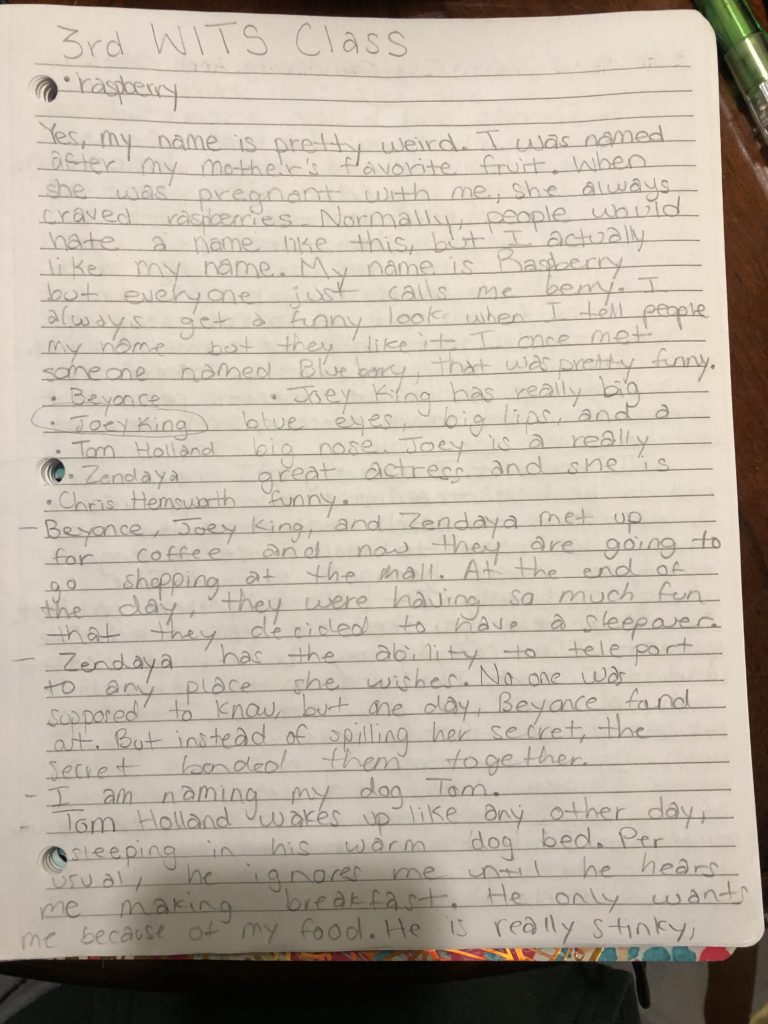
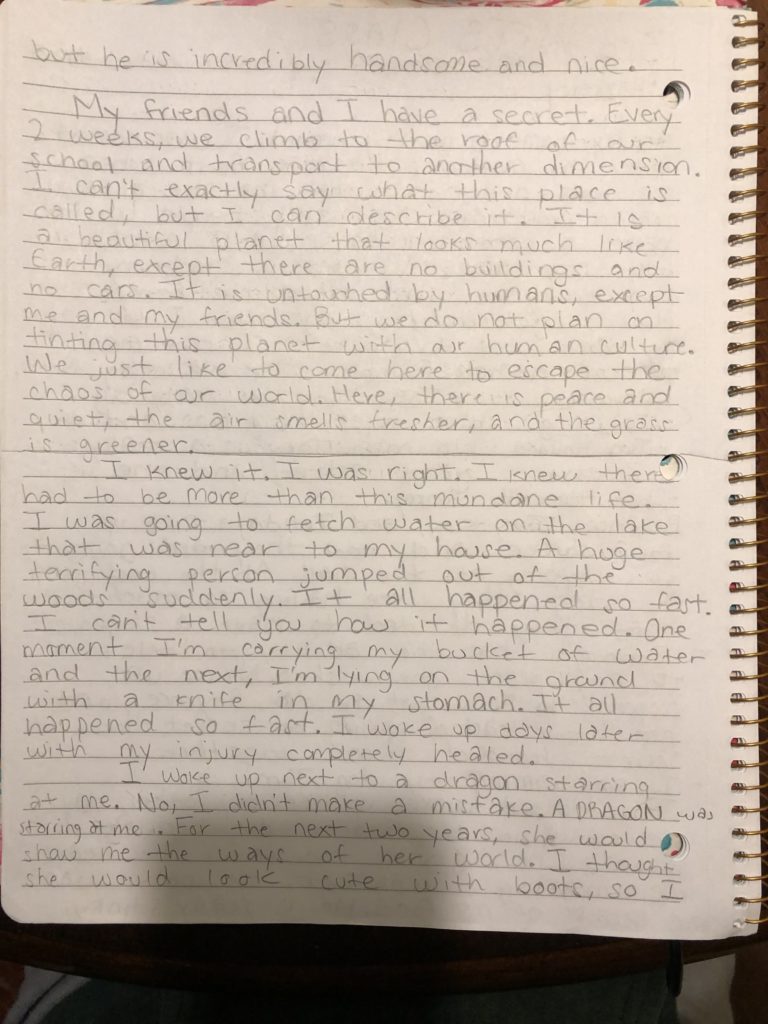
I was one hour late to the classroom observation period. AP Lit at Parkrose High School with Doina Moldovan started at 10:00am, but I’d had written in my schedule that the observation was at 11:00. All other teachers and all the students had already been there an hour when I arrived to the Zoom meeting, but Doina told me I was right on time. Matt had observed the first half of class, and I closely observed the second half. I watched Doina work the “room,” a screen of black boxes with names, watching in real time the homey energy of Doina’s personality translating to any format.
As a virtual teacher, Doina is supportive, she is smooth. She swept through her two hour AP class with a bright smile and laughter, calling out students by name and entertaining inside jokes that must have been going for weeks. The class was quiet, but never silent. The screen around her was black, but with a sense of outer peace. Doina’s open and welcoming teaching style made her so that she was able predict the reactions to papers still unwritten, Winter Break deadlines, and the play Fences, which the class was about the start reading. It all felt somewhat beyond natural, supernatural? And it was clear her students respect her completely, all of them seemingly tuned to her and each other as if inside a clock. Rather than a computer.
Doina’s foundation made it easy for Matt and I to enter the digital classroom space. The students were supportive using the chat function, and they were positive and engaged while Matt and I assigned increasingly absurd and quirky prompts throughout the semester. One student emailed us photographs of handwritten stories they’d written from our prompts in a composition notebook. And though I initially groaned about the struggle to add comments this way, I fell deeply into the imaginative and inspiring writing of our students as if I’d gotten to know them all in a regular way and not more like pen-pals. I didn’t even know what this student looked like. Only through her writing style was I able to imagine the kind of person who might come up with something like this or that.
Near the end of my time as a WITS apprentice, I met with the next apprentice, Aliera, to answer a few questions and offer an image of what my experience had been like. During the conversation, I caught myself in a sentence saying, “I know that in real life [something, something] . . .” What was that I had said? “In real life?”I quickly corrected myself and Aliera and I had a laugh. But, I was realizing the semester and the time we were currently living in had really come to feel more like a version of events, rather than simply being events themselves.
There had been moments during the course of the semester where I’d felt bad for myself. I’d thought about how much better I could have gotten to know writers and students if we weren’t in the middle a pandemic. I sometimes pictured lunch meetings a few blocks from Parkrose High School before class, swapping physical notes with other writers, marking a student’s handwritten stories with real pen ink. But this wasn’t the version of events I was living in, and the one I was meant to be a part of.
In spite of all things, I was able to work with an outstanding and celebrated team of writers, teachers, organizers, and mentors from Literary Arts and the Portland area. The hours in my classes with Matt, Doina, and Maleya flew by, inspired and lighthearted. My meetings and exchanges with Emilly, Jules, and other Literary Arts writers were motivational, interesting, and genuine. I was able to share my writing virtually at the WITS Writer Winter Reading and speak before a group, and I was given the tools to start planning my dream community of writers and work towards it. I made friends, connections, ideas, new dreams and goals, and the learning I did was incomparable. I’ve grown fond of the idea that maybe this version where we’re all pen pals—writing more than meeting—makes everything more anonymous, clandestine, cosmic, and mysterious. And that this was the version we were always meant to experience, even once, only us.
Fall WITS Apprentice CJ Wiggan is a Nebraskan writer and illustrator creating emotional artwork about gender, relationships, magic, nature, and hair. CJ relocated shortly after earning a double BA in English and Art from Black Hills State University in Spearfish, SD and now works in youth art programming in Portland. Some of CJ’s art can be found in Theories of HER: An Experimental Anthology, JUR(Y): The Journal of Undergraduate Research and Creative Activity, and a little bit on this locked tumblr page: https://chanelheart.tumblr.com.
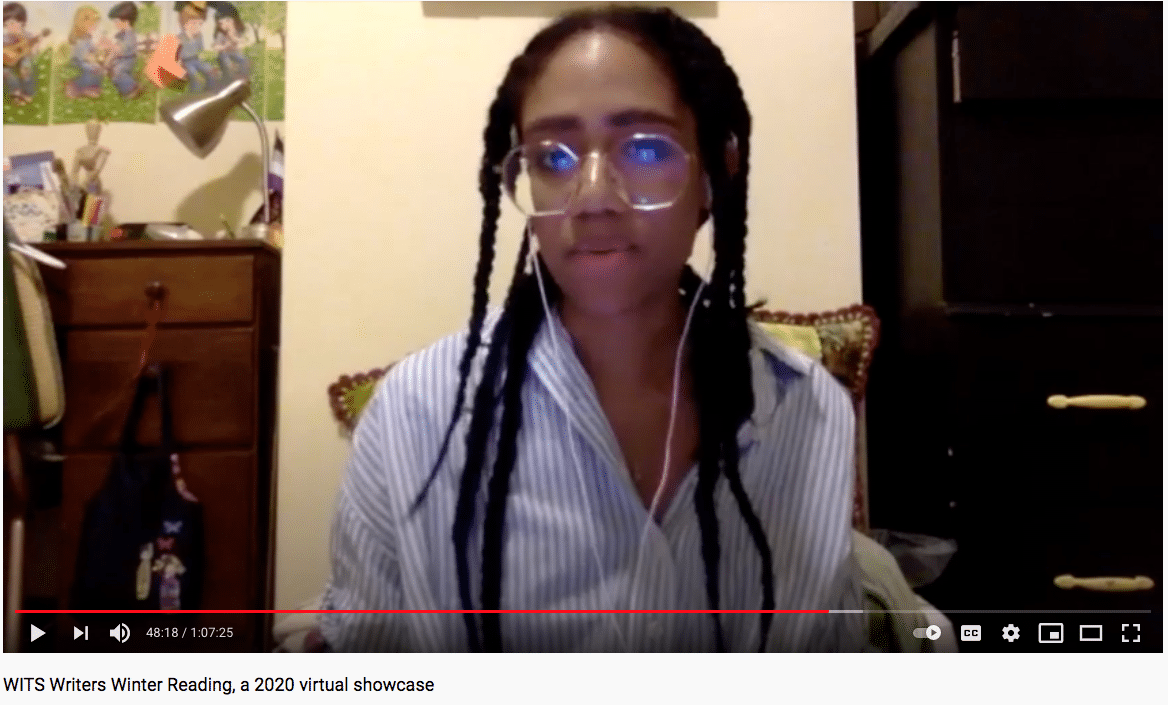
Watch CJ’s reading at the WITS Writers Winter Reading, a 2020 virtual showcase, here.
WITS offers apprenticeships for writers identifying as Black, Indigenous, and/or people of color (BIPOC). The BIPOC Apprenticeship for Writers is open for application once per year. To apply check back in fall of 2021, or email emilly@literary-arts.org for notice of when the application goes live.


